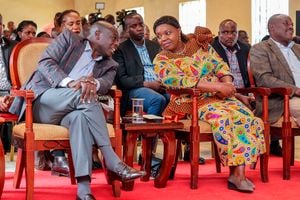Speculations on death of Kenyan elite, a dangerous trend
What you need to know:
- As a political analyst, however, I am intrigued by what appears to be a consistent tendency for people, especially the supporters of the departed, to always assume the death of a politician must always be suspicious.
- More important however is a deep-rooted mistrust of political elites, government, and security forces, which has developed over time.
The death of a Kenyan politician or political activist is often followed by rumours of foul play and claims of possible assassination.
This has included deaths of former KADU leader Ronald Ngala in a road accident in 1972 and veteran politician George Saitoti in a helicopter crash in June 2012.
Today, Kenyans are still mourning the untimely death of Raila’s Odinga’s son, Fidel, who was found dead in his house in Karen, Nairobi earlier this month.
Meanwhile, Mutula Kilonzo Junior has renewed allegations that his father, the late Makueni Senator – who died from internal bleeding on April 27,2013 – was poisoned and forensic evidence interfered with.
I do not know whether any of these deaths were the result of foul play or not, and my heart goes out to friends and families of the departed.
CONSISTENT TENDENCY
As a political analyst, however, I am intrigued by what appears to be a consistent tendency for people, especially the supporters of the departed, to always assume the death of a politician must always be suspicious.
Clearly many of these post-colonial deaths have been highly suspicious. For instance, the late J.M. Kariuki, whose burned remains were found along the Lake Magadi Road in March 1975, was last seen in the presence of a senior security officer outside Nairobi’s Hilton Hotel. Meanwhile, Robert Ouko’s security detail was withdrawn just days before he was found dead near his rural home in February 1990.
Also falling in this category are deaths of the rich which are often the subject of popular speculation and media coverage around the world.
And in Kenya, people often jump into conclusions on the causes of such deaths even without concrete evidence. Indeed the norm seems to be the spread of conspiracy theories before natural or accidental causes are proven and in most cases, this happens without evidence of foul play.
At one level, the suspicions are fuelled by a common theology that places primary emphasis on cause and effect in life – either through the hand of humans or the influence of the spiritual world – rather than on randomness, chaos or accident.
POLITICAL ELITES
More important however is a deep-rooted mistrust of political elites, government, and security forces, which has developed over time.
This mistrust is due, in part, to a long history of assassinations allegedly committed by people within or close to government.
This includes a number documented in detail in the Truth, Justice and Reconciliation Commission; namely, Pio Gama Pinto (1965), Tom Mboya (1969), J.M. Kariuki (1975), Robert Ouko (1990), and Crispin Odhiambo – the chair of the Devolution Committee of the Bomas Constitutional Conference who was shot by intruders in 2003. Allegations of assassinations have thus characterised the Kenyatta, Moi and Kibaki regimes.
In these deaths, the hand of various actors has been cited – from politicians and police officers to administrators and pathologists.
In turn, the current tendency to suspect foul play reflects a worryingly high level of mistrust in the country’s key institutions, despite the new Constitution and associated reforms. Moreover, mistrust appears to be particularly high when it comes to the deaths of politicians and security forces: this is understandable, but it is also incredibly dangerous.
First, questions regarding the motivations and legitimacy of a political regime often fuel dissent and protest. This can render effective governance increasingly difficult while at the same time motivating heavy-handed responses.
This was seen, for example, under Jomo Kenyatta when public protest following the death of Tom Mboya saw the only opposition party, the Kenya People’s Union banned while a parliamentary investigation into J.M. Kariuki’s death in the mid-1970s led to a spate of political detentions as the government was accused of foul play.
Second, it is generally accepted (at least in security studies) that effective policing requires the involvement of local communities. The common argument is that, communities help with the collection of intelligence and evidence, increases public confidence thereby helping to prevent crime. However, lack of trust has been a serious obstacle to effective policing and security.
Popular responses to untimely deaths thus provides further evidence of the need for the government, and for its security forces, to work harder to earn citizen’s trust rather than seek to manage, control and discipline, if it is going to govern efficiently and provide security.
Gabrielle Lynch is an Associate Professor of Comparative Politics at the University of Warwick ([email protected]; @GabrielleLynch6)





